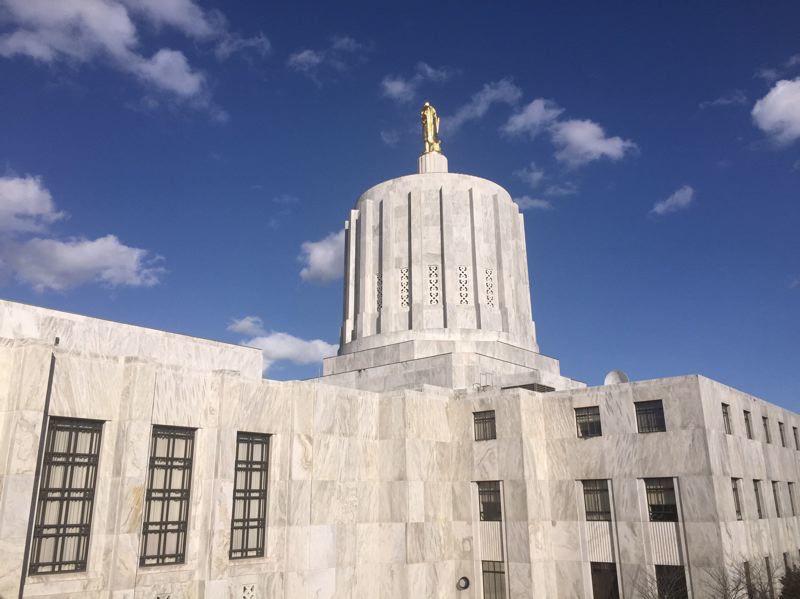Cascadia quake could cause massive fuel spill in Oregon
Published 1:25 pm Monday, February 7, 2022

- The Oregon State Capitol.
A new report has given rise to legislation requiring government and industry to show how they would contain a massive spill of gasoline, diesel and other fuels stored in a 6-mile-long area next to the Willamette River in Portland.
Senate Bill 1567 was scheduled for its first hearing Monday by the Senate Energy and Environment Committee. Its chief sponsor is Sen. Michael Dembrow, D-Portland, who said such a spill triggered by a severe earthquake off the Oregon coast would result in damage far beyond the storage area.
Trending
He said:
“We know that such an event would present an immediate danger to the community and first responders who would be called into the area to contain the damages. We know that millions of gallons of fuel could wind up in the Willamette and then the Columbia Rivers.
“We know that the state will not have the fuel it will need to recover from the catastrophe. At this point, we don’t know who will pay for the long-term costs of cleaning up after this emergency. But we do know that with the right planning, coordination, and oversight, we can reduce these risks and these expenses.
“It’s clearly the job of the Legislature to step up and get this work going.”
The legislation would require energy terminal owners to assess the risks from earthquakes and propose ways to deal with them in plans due to the Department of Environmental Quality by June 1, 2024. The Department of Energy would have to come up with a plan to prepare for earthquakes, protect communities against the effects of spills, and comply with the state’s goals for reduction of greenhouse gases.
Joint county-city report
Trending
The report was released earlier Monday by the Multnomah County Office of Sustainability and the Portland Bureau of Emergency Management, which split the $100,000 cost. They commissioned the report to analyze the aftermath of a seismic-caused rupture of the 630 tanks along a 6-mile stretch of U.S. Highway 30 between Sauvie Island and the Fremont Bridge. The report concluded that the 330 million gallons within the Critical Energy Infrastructure Hub, as the area is known, could spill more fuel than the 2010 Deepwater Horizon blowout — the nation’s largest to date at around 200 million gallons.
The 630 tanks contain all of the jet fuel used at Portland International Airport, and more than 90% of Oregon’s gasoline and diesel fuel.
“We can’t prevent a Cascadia earthquake, but we can plan for — and prevent — some of its most devastating impacts,” Deborah Kafoury, Multnomah County board chair, said as the report was released. “We need regulations equal to the risk that these facilities pose.”
The storage area was built years before the region’s earthquake risk was determined. The area sits atop soil that is unstable and likely to give way easily in an earthquake, a process known as liquefaction.
“If the CEI Hub fails in a Cascadia earthquake, the consequences will be borne disproportionately by Portlanders of color,” Portland City Commissioner Carmen Rubio said.”If we do not prepare for a disaster that we know is coming, what signal do you think we send to these communities?”
Other effects
Beyond the damage caused by ruptured fuel tanks, the report lists these other effects:
• Deaths and injuries from immediate explosions and evacuations, as well as the widespread longer-term health issues among workers involved in the cleanup and the local population who would be exposed to hazardous smoke and airborne toxins.
• Loss of habitat as far away as Astoria and the mouth of the Columbia River.
• Oiling of the shoreline for up to 1,000 waterfront properties in Oregon and Washington.
• Harm to fisheries, including potential devastating impacts to anadromous fish such as salmon that migrate up river from the Pacific Ocean.
• Loss of the cultural resources that tribes rely on for transportation, subsistence and ceremonial purposes and that are guaranteed by treaty.
• Closure of shipping and river traffic.
• Loss of recreation, from potential fires in Forest Park to the closure of fishing, swimming and boating in the Lower Willamette and Lower Columbia Rivers.
The report was prepared by ECONorthwest and Salus Resilience, both of Portland, and Enduring Econometrics, based in Spokane, Washington, and one of several firms that conducted assessments of damages after the Deepwater Horizon blowout.
“We often talk about oil spills and damage assessments after the fact,” Laura Marshall, project manager for ECONorthwest, said. “So it is heartening to see the region taking proactive steps to prevent the worst-case scenario from occurring so that those costs can be avoided.”
Rep. Dacia Grayber, D-Tigard, is a firefighter, chair of the House Committee on Veterans and Emergency Management, and the bill’s chief sponsor in the House.
“This is a public safety crisis that has the potential to unleash a disaster equal to the Deepwater Horizon spill, only right here in our city, at a cost to lives and our environment that I’m not sure we can even fathom,” Grayber said. “The time to take notice and wake up to the very real danger is long past. The clock is ticking, and we must take action.”





